
Annamacharya
Institute of Technology & Sciences
Rajampet, Estd. 1998
ISO 9001:2015

Annamacharya
Institute of Technology & Sciences
Rajampet, Estd. 1998
ISO 9001:2015

The Department of MCA was established in the academic year 2008-09 with the intake of 60 and now it has reached 180 affiliated to Jawaharlal Nehru Technological University Anantapur, Anantapur. It strives hard to develop world class, self disciplined computer professionals who will be responsible for uplifting the economical status of our Nation and humanity.
To become globally prominent and significant in the areas of academics and research keeping the aim of developing competitive professionals to serve the society and to light on the needs of ever changing software industry.
| S.No. | Programme Educational Objectives |
|---|---|
| PEO1 | Practice software engineering principles and standards to develop software to meet customer requirements across verticals. |
| PEO2 | Contribute to build sustainable and inclusive applications using mathematical, simulation and meta-heuristic models. |
| PEO3 | Demonstrate entrepreneurial qualities through individual competence and team work. |
| PEO4 | Achieve successful professional career with integrity and societal commitments leading to lifelong learning. |
MCA graduates of Annamacharya Institute of Technology & Sciences (Autonomous) will able to do the following at the time of graduation.
| S.No. | PROGRAM OUTCOMES (POs) |
|---|---|
| PO1 | Computational Knowledge: Acquire in-depth computational knowledge and mathematics with an ability to abstract and conceptualize models from defined problems and requirements. |
| PO2 | Problem Analysis: Identify, formulate, conduct literature survey and solve complex computing problems through analysis as well as provide optimal solutions. |
| PO3 | Design/Development of Solutions: Design and evaluate solutions for complex problems, components or processes that meet specified needs after considering public health and safety, cultural, societal, and environmental factors. |
| PO4 | Conduct investigations of complex Computing problems: Conduct literature survey to analyze and extract information relevant to unfamiliar problems and synthesize information to provide valid conclusions and interpret data by applying appropriate research methods, tools and design experiments. |
| PO5 | Modern Tool Usage: Create, select, adapt and apply appropriate techniques, resources and modern IT tools to complex computing system activities, with an understanding of the limitations. |
| PO6 | Professional Ethics: Understand and commit to professional ethics and cyber regulations, responsibilities, and norms of professional computing practices |
| PO7 | Life-long Learning: Engage in lifelong learning independently for continual development to improve knowledge and competence as a computing professional |
| PO8 | Project management and finance: Demonstrate knowledge and understanding of management principles and apply these to multidisciplinary software development as a team member and manage projects efficiently as a leader considering economical and financial factors. |
| PO9 | Communication Efficacy: Understand and communicate effectively with the computing community and with society at large, regarding complex computing systems activities confidently and effectively by writing effective reports and design documentations by adhering to appropriate standards, make effective presentations and give/receive clear instructions. |
| PO10 | Societal and Environmental Concern: Understand responsibilities and consequences based on societal, environmental, health, safety, legal and cultural issues within local and global contexts relevant to professional computing practices. |
| PO11 | Individual and Team Work: Function effectively as an individual, as a member or leader in diverse teams in multidisciplinary environments. |
| PO12 | Innovation and Entrepreneurship: Identify a timely opportunity for entrepreneurship and use innovation to pursue and create value addition for the betterment of the individual and society at large. |
| Sl No. | Name of the Faculty | Designation | Qualification | Date of Joining | Association Type | Photo |
| 1 | Dr. C. Madana Kumar Reddy | Associate Professor&Head | M.C.A, M.Phil, M.Tech., Ph.D. | 27.08.2001 | Regular | 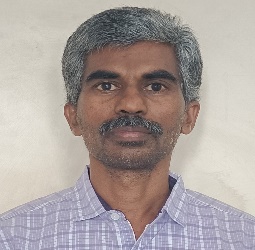 |
| 2 | P. Kavitha | Assistant Professor | M.C.A, M.Phil, Ph.D. | 17.06.2007 | Regular |  |
| 3 | N. Manoj Kumar Raju | Assistant Professor | M.Sc. (IS), M.Tech. | 01.01.2018 | Regular |  |
| 4 | S.Sathyanarayana | Assistant Professor | M.C.A | 01.01.2018 | Regular |  |
| 5 | B. Hari Krishna | Assistant Professor | M.C.A | 22.11.2021 | Regular |  |
| 6 | B. Bujji | Assistant Professor | M.C.A | 01.03.2022 | Regular |  |
| 7 | S. Mastan | Assistant Professor | M.Sc.(CS) | 31.03.2022 | Regular |  |
| 8 | M. Swathi | Assistant Professor | M.C.A | 18.07.2022 | Regular | 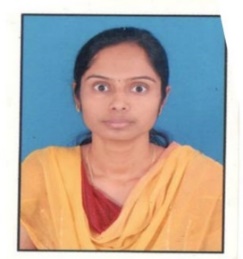 |
| 9 | J. Hari Krishna | Assistant Professor | M.C.A | 27.07.2022 | Regular |  |
| 10 | S. Haseena | Assistant Professor | M.C.A | 01.11.2022 | Regular | 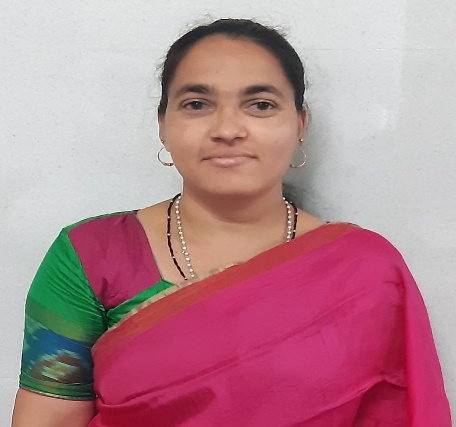 |
| 11 | S.Thabreez Basha | Assistant Professor | M.C.A | 14.06.2023 | Regular |  |
| 12 | D. Siva Sanjeev Kumar | Assistant Professor | M.C.A | 26.07.2024 | Regular |  |
| 13 | K. Adisekhar Babu | Assistant Professor | M.C.A | 23.09.2024 | Regular |  |
| S.No. | Name of the Faculty | Designation | Qualification | Date of Joining | Association Type |
| 1 | Dr. C. Madana Kumar Reddy | Associate Professor&Head | M.C.A, M.Phil, M.Tech., Ph.D. | 27.08.2001 | Regular |
| 2 | P. Kavitha | Assistant Professor | M.C.A, M.Phil, Ph.D. | 17.06.2007 | Regular |
| 3 | N. Manoj Kumar Raju | Assistant Professor | M.Sc. (IS), M.Tech. | 01.01.2018 | Regular |
| 4 | S.Sathyanarayana | Assistant Professor | M.C.A | 01.01.2018 | Regular |
| 5 | B. Hari Krishna | Assistant Professor | M.C.A | 22.11.2021 | Regular |
| 6 | B. Bujji | Assistant Professor | M.C.A | 01.03.2022 | Regular |
| 7 | S. Mastan | Assistant Professor | M.Sc.(CS) | 31.03.2022 | Regular |
| 8 | M. Hari Babu | Assistant Professor | M.C.A | 15.06.2022 | Regular |
| 9 | M. Swathi | Assistant Professor | M.C.A | 18.07.2022 | Regular |
| 10 | J. Hari Krishna | Assistant Professor | M.C.A | 27.07.2022 | Regular |
| 11 | S. Haseena | Assistant Professor | M.C.A | 01.11.2022 | Regular |
| 12 | P. Mabjan | Assistant Professor | M.C.A | 12.12.2022 | Regular |
| 13 | S.Thabreez Basha | Assistant Professor | M.C.A | 14.06.2023 | Regular |
| 14 | D. Siva Sanjeev Kumar | Assistant Professor | M.C.A | 26.07.2024 | Regular |
| 15 | K. Adisekhar Babu | Assistant Professor | M.C.A | 23.09.2024 | Regular |
| Sl.No | Name of the faculty | Designation | Qualification | Date of Joining | Association Type |
| 1 | Dr. N. Mallikharjuna Rao | Professor | M.C.A, M.Phil, M.Tech., Ph.D. | 13.10.1999 | Regular |
| 2 | Dr. C. Madana Kumar Reddy | Associate Professor&Head | M.C.A, M.Phil, Ph.D. | 27.08.2001 | Regular |
| 3 | P. Kavitha | Assistant Professor | M.Sc. (IS), M.Tech. | 17.06.2007 | Regular |
| 4 | N. Manoj Kumar Raju | Assistant Professor | M.C.A | 01.01.2018 | Regular |
| 5 | S.Sathyanarayana | Assistant Professor | M.C.A | 01.01.2018 | Regular |
| 6 | B. Hari Krishna | Assistant Professor | M.C.A | 22.11.2021 | Regular |
| 7 | B. Bujji | Assistant Professor | M.Sc.(CS) | 01.03.2022 | Regular |
| 8 | S. Mastan | Assistant Professor | M.C.A | 31.03.2022 | Regular |
| 9 | M. Hari Babu | Assistant Professor | M.C.A | 15.06.2022 | Regular |
| 10 | M. Swathi | Assistant Professor | M.C.A | 18.07.2022 | Regular |
| 11 | J. Hari Krishna | Assistant Professor | M.C.A | 27.07.2022 | Regular |
| 12 | S. Haseena | Assistant Professor | M.C.A | 01.11.2022 | Regular |
| 13 | P. Mabjan | Assistant Professor | M.C.A | 12.12.2022 | Regular |
| 14 | S.Thabreez Basha | Assistant Professor | M.C.A | 14.06.2023 | Regular |
| S.NO | NAME OF THE FACULTY | DESIGNATION | Qualification | DOJ | Association Type |
| 1 | Dr. N. Mallikarjuna Rao | Professor | M.C.A, M.Phil, M.Tech., Ph.D. | 13-Oct-1999 | Permanent |
| 2 | Dr. C. Madana Kumar Reddy | Associate Professor | M.C.A, M.Phil, Ph.D. | 9-Aug-2008 | Permanent |
| 3 | P. Kavitha | Assistant Professor | M.Sc. (IS), M.Tech. | 17-Jun-2007 | Permanent |
| 4 | N. Manoj Kumar Raju | Assistant Professor | M.C.A | 1-Dec-2017 | Permanent |
| 5 | S. Satyanarayana | Assistant Professor | M.C.A | 1-Dec-2017 | Permanent |
| 6 | B. Hari Krishna | Assistant Professor | M.C.A | 22-Nov-2021 | Permanent |
| 7 | B. Bujji | Assistant Professor | M.Sc.(CS) | 1-Mar-2022 | Permanent |
| 9 | S. Mastan | Assistant Professor | M.C.A | 31-Mar-2022 | Permanent |
| 10 | M. Hari Babu | Assistant Professor | M.C.A | 15-Jun-2022 | Permanent |
| J. Hari Krishna | Assistant Professor | M.C.A | 27-Jul-2022 | Permanent | |
| 11 | K. Reddaiah | Assistant Professor | M.C.A | 1-May-2022 | Permanent |
| 12 | B. Subbanna | Assistant Professor | M.C.A | 1-Mar-2022 | Permanent |
| S.No | Name | Designation |
| 1 | A.Sathyavathi | DEO |
| 2 | S.Sai Kumar | Sub-Staff |
| 3 | T.Venkata Ramana | Sub-Staff |
| Amount of Industrial Consultancy earned ( in lakhs of rupees) | Nil |
| No. of sponsored research projects completed | Nil |
| No. of Patents produced | 01 |
| No. of sponsored research projects in progress | Nil |
| No. of papers published in International Journals | 29 |
| No. of papers published in National Journals | 02 |
| No. of papers presented in International Conferences/Seminars | 12 |
| No. of papers presented in National Conferences/Seminars | 04 |
| No. of International Conferences Conducted | Nil |
| No. of National Conferences Conducted | 06 |
| No. of training Programmes/Short Term Courses Conducted | 04 |





The department has good Air Conditioned Computer Laboratory equipped with advanced configurations. All the computers are networked and protected from all known viruses and firewall to have complete data security. To ensure continues usability of computers to the students, all the computers have a power backup with uninterrupted power supply (UPS) up to 5 hours. Essential licensed software is provided to all systems to support the academic curriculum.
| S.No. | MIC LAB | Name of the Lab Equipment |
| 1 | 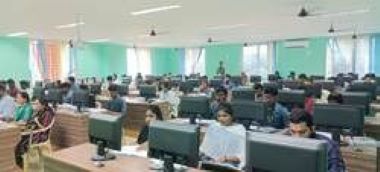 |
|
| 2 | 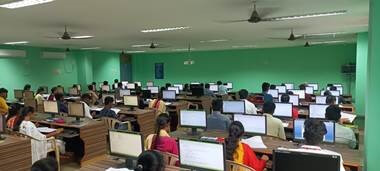 |
|
| S.No. | LAB 2 | Name of the Lab Equipment |
| 1 | .jpg) |
|
| 2 | .jpg) |
|
| S.NO | MIC LAB | Name of the Lab Equipemtnt |
| 1 |  |
LENOVO 3156AS4 : DESKTOP Intel H61 Chipset : Intel Core i3-2120 Processor 4GB DDR3 RAM 250GB Hard Disk 18.5 Wide LED Monitor USB Key Board & Mouse |
| 2 |  |
LCD Projector (ViVetek) D-Link 24 port Switches ESSAR Delta H-20 KVA OL UPS With SMF Batteries EPSON Dot Matrix Printer |
| SNO. | Name of the Faculty | Title of the Paper | Name of the Journal/Publisher | Date | |
|---|---|---|---|---|---|
| 2022 | |||||
| 1 | N.Mallikarjuna Rao | Intuitionistic fuzzy rough sets and fruit fly algorithm for association rule mining | International Journal of System Assurance Engineering and Management | Jan-22 | |
| 2 | C.Madana Kumar Reddy | Humidity as well as Temperature Tracking Related Internet of Things with Arduino UNO | International Journal of humanities, Law and Social Sciences | May-22 | |
| 3 | N.Narsimha Prasad | Patient Monitoring System in the context of Artificial Intelligence in ICU | Bulletin of Environment, Pharmacology and Life Sciences | April 2022 | |
| 4 | P.Swathi | Packet Procceding Attacks In Mobile Adhoc Networks:Security and Reliable Detection | International Journal of Advanced Reseach in Science and Engineering | Jan-22 | |
| 2021 | |||||
| 1 | N.Mallikarjuna Rao | Outcome-based education: a paramount model for higher educational institutions in india | International journal of continuing engineering education and life-long learning | oct2021 | |
| 2 | P.Swathi | Enhancement of Degraded Images via Fuzy Intensification Model . | INTERNATIONAL CONFERENCE ON CYBERNETICS,COGNITION AND MACHINE LEARNING APPLICATIONS | Airl 2021 | |
| 3 | C.Sasidhar | Outcome-based education: a paramount model for higher educational institutions in india | International journal of continuing engineering education and life-long learning | oct2021 | |
| 4 | N.Mallikarjuna Rao | Outcome-based education: a paramount model for higher educational institutions in India | International Journal of Continuing Engineering Education and Life-Long Leaning | Aug-21 | |
| 2020 | |||||
| 1 | P.Kavitha | A Speculative Model to explore Data Hub and QoS in IAAS Cloud Computing Systems | International journal of Engineering Research | Jan-20 | |
| 2 | N.Mallikarjuna Rao | Improving knowledge and competency of students in higher educational institutions by employing Lean Six Sigma model | Int. J. Six Sigma and Competitive Advantage, | Nov-20 | |
| 3 | V.Satyendra Kumar | Seasonal forecasting of mobile data traffic in GSM networks with linear trend | Journal of Applied Science and Engineering | oct2020 | |
| 4 | C.Sasidhar | Improving knowledge and competency of students in higher educational institutions by employing Lean Six Sigma model | Int. J. Six Sigma and Competitive Advantage, | Nov-20 | |
| 2019 | |||||
| 1 | C.Madana Kumar Reddy | Health Monitoring system by using IOT device in the realtime environment | International journal of Engineering Research | Oct-19 | |
| 2 | P.Kavitha | Mobility Pattern Probing of Mobile Users using Call Data Record Dataset | International journal of Engineering Research | Nov-19 | |
| 2018 | |||||
| 1. | Dr. N.Mallikharjuna Rao | Minimizing network cost by employing sliding window method at mobile switching centers in GSM network | Int. J. Mobile Network Design and Innovation (Inderscience Publishers) | 2018 | |
| 2. | V.Sathyendra Kumar | A Study on Call Data Records in Data Centres: Incoming Calls and Outgoing Calls | International Journal of Engineering and Techniques | 2018 | |
| 3. | P.Kavitha | A Study on call data records in data centers incoming calls and outgoing calls | International Journal of Engineering and Techniques | May, 2018 | |
| 4. | V.Sathyendra Kumar | Time Series Analysis with CDR Datasets in Mobile Networks | International Conference on Recent Trends in Science and Management | 23rd Novemnber and 24th November 2018 | |
| 2017 | |||||
| 5. | Dr. N.Mallikharjuna Rao | Minimizing Network Cost by employing Sliding Window Method at Mobile Switching Center in GSM Network | International Conference on Recent Trends in Science and Management | 23rd Novemnber and 24th November 2018 | |
| 6. | Dr. N.Mallikharjuna Rao | Measurement of Mobile Switching Centres Throughput in GSM Network Integrating Sliding Window Algorithm with a Multiple Channel Finite Queuing Model | Welfenia Journal | 2017 | |
| 7. | Dr. C.Madana Kumar Reddy | Knowledge-Based Decision Support System for Analyzing the Relevancies of Various Attributes Based on Their Characteristics | IGI Global | 2017 | |
| 8. | V.Sathyendra Kumar | An Empirical Study on Mobile Call Data using SPSS | International Conference on Recent Trends in Computing Technology | 21st April, 2017 | |
| 9. | V.Sathyendra Kumar | A Study on the performance of Mobile Call Data in Cellular Networks | International Conference on Advanced Technologies in Engineering, Management and Sciences | 16th & 17th November, 2017 | |
| 10. | V.Sathyendra Kumar | A Prediction Analysis and Performance Improvements of Mobile call data using clustering Algorithm | National Conference on Recent Innovations in Engineering and Technology | 15th and 16th December, 2017 | |